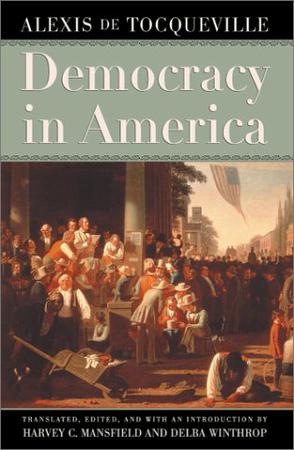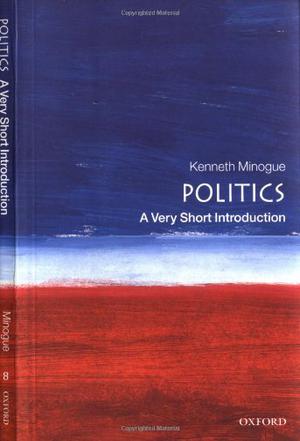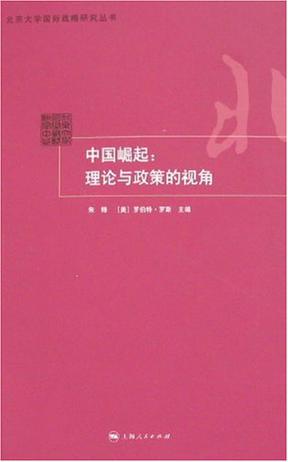-

Democracy in America
Alexis de Tocqueville (1805-59) came to America in 1831 to see what a great republic was like. What struck him most was the country's equality of conditions, its democracy. The book he wrote on his return to France, Democracy in America, is both the best ever written on democracy and the best ever written on America. It remains the most often quoted book about the United States, not only because it has something to interest and please everyone, but also because it has something to teach everyone. When it was published in 2000, Harvey Mansfield and Delba Winthrop's new translation of Democracy in America—only the third since the original two-volume work was published in 1835 and 1840—was lauded in all quarters as the finest and most definitive edition of Tocqueville's classic thus far. Mansfield and Winthrop have restored the nuances of Tocqueville's language, with the expressed goal "to convey Tocqueville's thought as he held it rather than to restate it in comparable terms of today." The result is a translation with minimal interpretation, but with impeccable annotations of unfamiliar references and a masterful introduction placing the work and its author in the broader contexts of political philosophy and statesmanship. -

No Place to Hide
In May 2013, Glenn Greenwald set out for Hong Kong to meet an anonymous source who claimed to have astonishing evidence of pervasive government spying and insisted on communicating only through heavily encrypted channels. That source turned out to be the 29-year-old NSA contractor Edward Snowden, and his revelations about the agency’s widespread, systemic overreach proved to be some of the most explosive and consequential news in recent history, triggering a fierce debate over national security and information privacy. As the arguments rage on and the government considers various proposals for reform, it is clear that we have yet to see the full impact of Snowden’s disclosures. Now for the first time, Greenwald fits all the pieces together, recounting his high-intensity ten-day trip to Hong Kong, examining the broader implications of the surveillance detailed in his reporting for The Guardian, and revealing fresh information on the NSA’s unprecedented abuse of power with never-before-seen documents entrusted to him by Snowden himself. Going beyond NSA specifics, Greenwald also takes on the establishment media, excoriating their habitual avoidance of adversarial reporting on the government and their failure to serve the interests of the people. Finally, he asks what it means both for individuals and for a nation’s political health when a government pries so invasively into the private lives of its citizens—and considers what safeguards and forms of oversight are necessary to protect democracy in the digital age. Coming at a landmark moment in American history, No Place to Hide is a fearless, incisive, and essential contribution to our understanding of the U.S. surveillance state. Amazon -

Theories of International Politics and Zombies
What would happen to international politics if the dead rose from the grave and started to eat the living? Daniel Drezner's groundbreaking book answers the question that other international relations scholars have been too scared to ask. Addressing timely issues with analytical bite, Drezner looks at how well-known theories from international relations might be applied to a war with zombies. Exploring the plots of popular zombie films, songs, and books, "Theories of International Politics and Zombies" predicts realistic scenarios for the political stage in the face of a zombie threat and considers how valid - or how rotten - such scenarios might be. Drezner boldly lurches into the breach and 'stress tests' the ways that different approaches to world politics would explain policy responses to the living dead. He examines the most prominent international relations theories - including realism, liberalism, constructivism, neoconservatism, and bureaucratic politics - and decomposes their predictions. He digs into prominent zombie films and novels, such as Night of the Living Dead and World War Z, to see where essential theories hold up and where they would stumble and fall. Drezner argues that by thinking about outside-of-the-box threats we get a cognitive grip on what former U.S. Secretary of Defense Donald Rumsfeld famously referred to as the 'unknown unknowns' in international security. Correcting the zombie gap in international relations thinking and addressing the genuine but publicly unacknowledged fear of the dead rising from the grave, "Theories of International Politics and Zombies" presents political tactics and strategies accessible enough for any zombie to digest. -

Politics
In this provocative but balanced essay, Kenneth Minogue discusses the development of politics from the ancient world to the twentieth century. He prompts us to consider why political systems evolve, how politics offers both power and order in our society, whether democracy is always a good thing, and what future politics may have in the twenty-first century. -

中国崛起
《中国崛起:理论与政策的视角》是由中美日韩四国学者共同完成的关于“中国崛起”的理论研究。随着中国经济力量的日益提升,中国对世界的影响也在日益增多,同时其他国家对于逐渐强大的中国在世界事务中将发挥怎样的作用甚至将对国际格局产生怎样的影响也格外关心。强大的中国对于国际社会究竟意味着什么?《中国崛起:理论与政策的视角》的作者们便试图对这一问题展开学理性的探究。《中国崛起:理论与政策的视角》的中心议题是“中国崛起”及其对国际关系中权力分配、合作与冲突、地区安全局势以及全球政治的未来等诸多话题的影响和冲击。在《中国崛起:理论与政策的视角》中,各国学者重点运用了国际关系理论中的“权力转移”(powertransition)假设来探讨和考察当前“中国崛起”所导致的权力再分配以及随之出现的变化,目的是在当前国际政治背景下研究和把握中美两国“权力转移”有可能出现的趋势和将会产生的后果。 《中国崛起:理论与政策的视角》所收录的各篇论文并不只是从单一理论的角度来分析和论证中国的崛起,也并非只是从一个理论视点来提供“中国崛起”有可能带来的国际影响和安全作用的分析与预测;相反,《中国崛起:理论与政策的视角》综合了国际关系学者对于中美两国之间“权力转移”的多方面的看法和意见,包括使用多种国际关系理论分析工具及对多样化的国家外交政策进行研究。《中国崛起:理论与政策的视角》由三部分共13篇论文组成。第一部分从权力转移理论的角度分析了中国的崛起对世界格局的影响,第二部分则从区域稳定的理论出发对中国崛起进行了探讨,第三部分分析了其他国家对中国崛起的政策反应。 -

大抉择